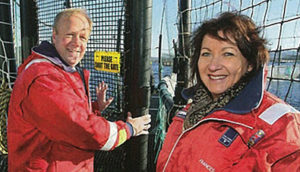Read the latest information on
Foot-and-mouth disease
 Peter and Frances Bender’s fish farm and processing business, Huon Aquaculture Pty Ltd took out the 2013 Biosecurity Farmer of the Year Award in the animal category.
Peter and Frances Bender’s fish farm and processing business, Huon Aquaculture Pty Ltd took out the 2013 Biosecurity Farmer of the Year Award in the animal category.
Peter and Frances won the award because biosecurity has been ‘second nature’ since it began 25 years ago.
They diversified from cattle to salmon farming in 1988. Their company has now evolved into a vertically integrated business, farming, processing and selling Atlantic salmon and rainbow trout products to domestic and international markets and employing more than 400 staff.
Kathleen Plowman, AHA Chief Executive Officer, said the company’s commitment to making biosecurity central to the company’s business model with the development of a plan that covers all stages of fish production, from the hatchery to the plate, has been critical to the Bender’s success.
“There were three key points of difference that made Peter and Frances stand out from the other two finalists. The first was their commitment to making biosecurity ‘everyone’s business’, ensuring that all staff took ownership of biosecurity matters.
“The second key point is Peter and Frances’ work on international and state biosecurity issues they undertake on behalf of Tasmanian and national industry organisations. Huon Aquaculture is proactively involved in developing a state-wide comprehensive biosecurity plan between industry and government.
As a result of their dedication, they have helped elevate the standard and necessity of good biosecurity practice in the fish farming and processing industry both in Tasmania and the nation.
“The third point, which elevated Peter and Frances as winners amongst this competitive group of finalists, was the implementation of their whole of chain biosecurity plan. The plan covers all aspects fish farming and processing, including education and training and implementing good fish husbandry through water quality management, health monitoring, vaccine use and on-going research.
“Peter and Frances have embodied the Farm Biosecurity motto ‘secure your farm: secure your future’. The Benders see biosecurity as critical to risk mitigation and disease prevention and minimisation and that’s why they have won the 2013 Animal Biosecurity Farmer of the Year Award,” Ms Plowman said.
For Peter and Frances, on-farm biosecurity practices are simply part of the process. In their award application they describe it as “putting on a seatbelt, eventually it all makes sense to most people and becomes routine.”